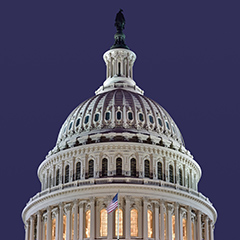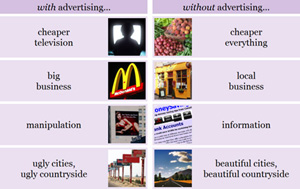Regulation Will Kill the Web
| with web regulations… | without web regulations… | |
 |
||
|
politicians
decide |
|
people
decide |
 |
||
|
oppressive
legislation |
|
technical
solutions |
 |
||
|
incumbents
thrive |
|
disrupters
thrive |
 |
||
|
stagnation
|
|
innovation
|








Notes
Misguided regulations such as GDPR and PIPEDA are slowly strangling the web
I’ve been dismayed by the quiet complacency of the media – along with politicians of all stripes – in the face of recent attempts to regulate the web. The chattering classes may fight among themselves over the fine details of the legislation, but they seem never for a moment to question their right to tell the rest of us what to do. It’s no wonder there’s a backlash against the liberal élite all over the world.
The best legislation doesn’t extend to thousands of pages of legal fine print: it can be expressed in a single sentence. Take net neutrality, one of the most basic principles of the Internet. It can be stated in a few words: don’t discriminate between different traffic on the Internet. The worst legislation, in contrast, tries to micromanage every aspect of what we all do every day of our lives.
Politicians imagine, when they regulate the web, that they’re going after tech giants like Facebook and Google. The reality is that the burden of these regulations falls largely on smaller businesses and individuals, who don’t command legions of coders and lawyers. I know: working for a startup, as well as on several side projects of my own, I’ve spent an inordinate amount of time recently trying to comply with legislation that benefits no one, time that I might otherwise have spent building new technologies.
Why does this matter? The unprecedented wealth we enjoy today is built on centuries of small but steady productivity gains, founded on the innovations of free thinkers of past generations. When governments force us to spend our time conforming to their dictates instead of innovating, they’re depriving future generations of better education, better health, better environment, better society. The politicians don’t care – they’ll be long out of office by the time any cumulative productivity gains afford our children and grandchildren a better life – but we should care.
In my mind, however, this is less a question of economics than one of freedom. When did we forget that tyranny is a bad thing? Or decide that government micromanagement of our lives is not tyranny? Politicians seem unaware that most of what’s on the web is published not by Google and Facebook but by individuals; by regulating what we are and aren’t allowed to do on the web, they’re constraining not corporations but citizens.
The web offers people freedom of expression and, crucially, freedom to earn a living outside of the confines of government-approved organizations such as corporations. If politicians want to free us from the clutches of Facebook and Google, they should let us do what we like on the web, without fear of fines so disproportionate that they’d ruin us. Leave us alone, we’ll re-invent the web in ways none of us can quite imagine, ways that will leave Facebook and Google for dead.
Subscribe now and I’ll let you know whenever I create a new visualization
It’ll only be every couple of months or so, I won’t let anyone else have your email address, and you can unsubscribe at any time
Thanks for subscribing!
Check your inbox for an email to confirm your subscription
Oh no, something went wrong, and I was unable to subscribe you!
Please refresh your browser and try again
Podcasts
EconTalk – A weekly podcast from the Library of Economics and Liberty that explores economics from a libertarian perpective. The episode with Michael Munger on Permissionless Innovation is especially relevant to this discussion of web regulation. Should we have to ask the government for permission to do something different, on the web or in any other aspect of our lives?
Building Tomorrow – This new podcast from Libertarianism.org promises to “explore the ways technology, innovation, and entrepreneurship are creating a freer, wealthier, and more peaceful world”, which seems a bit utopian. With just five episodes released to date, it’s unproven, but the positive, hands-off approach to technology makes a change from the mainstream media’s reflexively dystopian, how-can-we-stop-this spin.
If a podcast is listed on things made thinkable, it means I listen to it regularly and can recommend it as a thought-provoking follow-up to this visualization
Images
Wikimedia Commons – Diliff – The dome of the US Capitol building
pixabay – sasint – fatigued-young-laptop-beautiful
Wikimedia Commons – Jacklee – The Subsidiary Legislation of the Republic of Singapore
Wikimedia Commons – Arne Nordmann – Spring-cover pocket clock
pixabay – MichaelGaida – architecture-skyscraper
pixabay – stuartlimedigital – small-office-architecture
Text
A text summary of this presentation is shown below for easy reference
politicians decide
do you want your browser to bombard you with pop-ups every time you visit a web site? do you want your inbox to overflow with interminable legal agreements explaining how your privacy will be protected? politicians who don’t know their iPhones from their typewriters have decreed that this is how it will be, whether you like it or not
people decide
most of us like getting services like Instagram and Twitter for free; most of us don’t mind if the ads we’re shown are for things advertisers think we’ll be interested in; most of us don’t care precisely how our banks keep our savings secure when we use online bankings; without regulations, we’d be free to decide for ourselves what we want from the web
oppressive legislation
the taxes levied by the Tea Act of 1773 seem paltry compared to the fines governments can now impose for the crime of storing a few bytes of data on a computer; the former sparked a revolution… why not the latter? admittedly, for corporations such as Facebook and Google, these fines are limited to a mere 4% of annual revenue, but for individuals trying to eke out an independent living on the web, they can run to thousands or even millions of times any income from their endeavour
technical solutions
technical problems have a habit of finding technical solutions long before they attract the attention of laggard politicians: governments passed anti-spam legislation long after spam filters achieved 100% efficacy, anti-cookie legislation long after browsers offered complete control over cookies, and anti-ad legislation long after ad blockers became freely available
incumbents thrive
incumbents like Facebook and Google love regulations: billion-dollar fines mean little to these behemoths; compliance is a breeze when you can afford armies of coders and lawyers; regulations make it so much more difficult to grow a business that Facebook and Google need no longer fear smaller competitors’ challenging their supremacy
disrupters thrive
if Gutenburg had been forced, under penalty of ruinous fines, to comply with rigid regulations concerning the production of illuminated manuscripts, we’d never have had the printing press; disrupters thrive when they’re free to try new things, rather than forced to follow prescriptions laid down by micromanaging mediocrities
stagnation
wondering why Facebook and Google aren’t dead yet? I’m working on it, but the truth is, I’ve been forced to spend so much time recently trying to comply with pointless web regulations, both in my professional life and in my personal projects, that innovation has taken a bit of a back seat
innovation
humans are inveterate innovators; left alone, we’ll re-invent the web in ways none of us can quite imagine, ways that will leave Facebook and Google for dead
Date
First published 29 July 2018











Comments
Click here to leave a comment
Thanks for your comment!
I’ll check it and put it live as soon as I can
Oh no, something went wrong, and I was unable to post your comment!
Please refresh your browser and try again
rip ⋅ 20 October 2021
Oh, really? We don't need the FCC (in the US) to regulate airwaves? Or any other government agency to regulate what's in our environment, air flight rules, etc.?
Left to their own devious devices, the conglomerates will continue to conglomerate and decide for you and me what is coming down the innertubes. Comcast or Amazon or Google. No small indies anymore.
Mark Jeffery ⋅ 20 October 2021
Thanks for the comment, rip! Like you, I'd love to see small indies thrive. I just don't think web regulations help the small indies, I think they help the conglomerates!
I'm a small indie myself, and I just can't keep up with all the web regulations. The conglomerates can: they have teams of lawyers to deal with all the rules.
I agree with you, there's a place for regulation, when it comes to the airwaves, the air lanes and the environment. It just seems oppressive when it comes to the web.